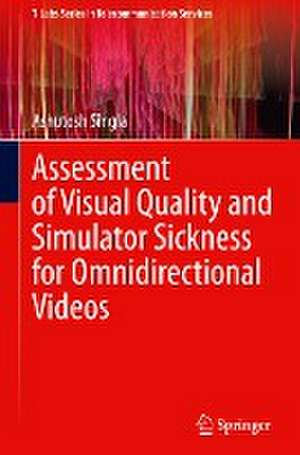Assessment of Visual Quality and Simulator Sickness for Omnidirectional Videos: T-Labs Series in Telecommunication Services
Autor Ashutosh Singlaen Limba Engleză Hardback – 9 feb 2024
Din seria T-Labs Series in Telecommunication Services
- 15%
 Preț: 640.55 lei
Preț: 640.55 lei - 15%
 Preț: 641.20 lei
Preț: 641.20 lei - 15%
 Preț: 642.83 lei
Preț: 642.83 lei - 15%
 Preț: 639.25 lei
Preț: 639.25 lei - 24%
 Preț: 633.86 lei
Preț: 633.86 lei - 15%
 Preț: 642.03 lei
Preț: 642.03 lei - 20%
 Preț: 645.31 lei
Preț: 645.31 lei - 15%
 Preț: 644.63 lei
Preț: 644.63 lei - 20%
 Preț: 579.77 lei
Preț: 579.77 lei - 15%
 Preț: 641.53 lei
Preț: 641.53 lei - 15%
 Preț: 644.82 lei
Preț: 644.82 lei - 15%
 Preț: 638.24 lei
Preț: 638.24 lei - 20%
 Preț: 702.56 lei
Preț: 702.56 lei - 18%
 Preț: 999.45 lei
Preț: 999.45 lei - 15%
 Preț: 641.03 lei
Preț: 641.03 lei - 15%
 Preț: 637.46 lei
Preț: 637.46 lei - 18%
 Preț: 719.59 lei
Preț: 719.59 lei -
 Preț: 378.54 lei
Preț: 378.54 lei - 15%
 Preț: 639.08 lei
Preț: 639.08 lei - 15%
 Preț: 637.13 lei
Preț: 637.13 lei - 15%
 Preț: 642.68 lei
Preț: 642.68 lei - 15%
 Preț: 640.06 lei
Preț: 640.06 lei - 15%
 Preț: 652.31 lei
Preț: 652.31 lei - 15%
 Preț: 642.03 lei
Preț: 642.03 lei -
 Preț: 386.61 lei
Preț: 386.61 lei - 20%
 Preț: 552.67 lei
Preț: 552.67 lei - 15%
 Preț: 645.47 lei
Preț: 645.47 lei - 15%
 Preț: 636.94 lei
Preț: 636.94 lei - 15%
 Preț: 642.18 lei
Preț: 642.18 lei - 15%
 Preț: 632.70 lei
Preț: 632.70 lei - 15%
 Preț: 638.24 lei
Preț: 638.24 lei - 20%
 Preț: 648.95 lei
Preț: 648.95 lei - 18%
 Preț: 943.57 lei
Preț: 943.57 lei
Preț: 780.52 lei
Preț vechi: 951.85 lei
-18% Nou
Puncte Express: 1171
Preț estimativ în valută:
149.37€ • 154.31$ • 124.31£
149.37€ • 154.31$ • 124.31£
Carte tipărită la comandă
Livrare economică 26 martie-09 aprilie
Preluare comenzi: 021 569.72.76
Specificații
ISBN-13: 9783031499876
ISBN-10: 3031499875
Pagini: 142
Ilustrații: XIV, 142 p. 56 illus., 47 illus. in color.
Dimensiuni: 155 x 235 mm
Greutate: 0.4 kg
Ediția:1st ed. 2024
Editura: Springer Nature Switzerland
Colecția Springer
Seria T-Labs Series in Telecommunication Services
Locul publicării:Cham, Switzerland
ISBN-10: 3031499875
Pagini: 142
Ilustrații: XIV, 142 p. 56 illus., 47 illus. in color.
Dimensiuni: 155 x 235 mm
Greutate: 0.4 kg
Ediția:1st ed. 2024
Editura: Springer Nature Switzerland
Colecția Springer
Seria T-Labs Series in Telecommunication Services
Locul publicării:Cham, Switzerland
Cuprins
Introduction.- Visual Quality Assessment of 360.- State of the Art.- Technical Setup.- Comparison of Different Subjective Test Methods.- Visual Quality Assessment for 360.- SSQ Assessment for 360 Videos.- Performance Analysis of SSQ.- Evaluation of Different Constructs.- Media Quality, Simulator Sickness and Presence.- Future Work.- Conclusion.
Notă biografică
Ashutosh Singla received his M.Sc degree in Communications Engineering from RWTH Aachen in May 2015, with a master's thesis on HEVC video coding optimization (Prof. Jens Rainer Ohm). From March 2016 to September 2016, he worked in the Multimedia Signal Processing Group (MMSPG, Prof. Touradj Ebrahimi) at the Swiss Federal Institute of Technology (EPFL), Lausanne, Switzerland, on a project for food image classification and recognition. Since September 2016, he has been working in the Audiovisual Technology Group at TU Ilmenau. In February 2022, he got his PhD in the field of Video Quality and Simulator Sickness Assessment for 360° videos under the supervision of Prof. Dr.-Ing. Alexander Raake.
Textul de pe ultima copertă
This book presents extensive research on the quality of 360° video perceived by users with HMDs. The book aims to develop a set of standard guidelines for the systematic visual quality assessment of 360° videos. Firstly, conventional subjective test methods such as Absolute Category Rating (ACR) and Double Stimulus Impairment Scale (DSIS) are applied to evaluate video quality, alongside the Modified ACR (M-ACR) method newly proposed. Building on the reliability and general applicability of the procedure across different tests, a methodological framework for 360° video quality assessment is then presented. The author also analyzes simulator sickness to investigate the impact of different influencing factors. The insights gained on simulator sickness related to 360° video contribute to a better understanding of this particular use case of VR and can help to improve comfort among users by suggesting improvements in the technical specifications of 360° video and HMD technology and thus improving QoE.
- Presents extensive research on the quality of 360° video perceived by users with HMDs;
- Develops a set of standard guidelines for the systematic visual quality assessment of 360° videos;
- Analyzes simulator sickness to investigate the impact of different influencing factors.
Caracteristici
Presents extensive research on the quality of 360° video perceived by users with HMDs Develops a set of standard guidelines for the systematic visual quality assessment of 360° videos Analyzes simulator sickness to investigate the impact of different influencing factors
